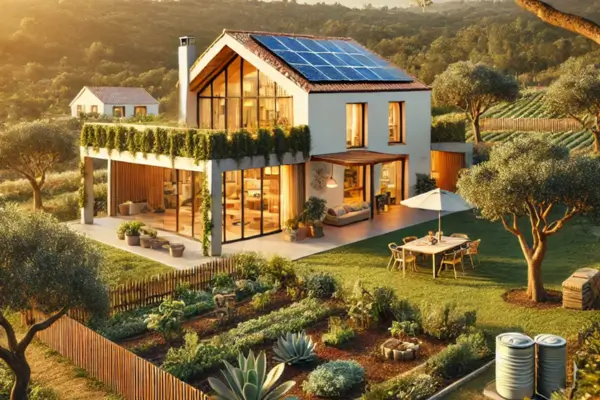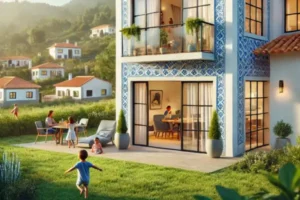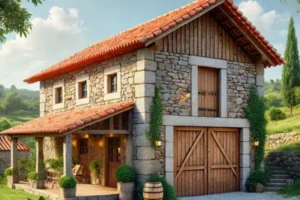Portugal has become a top destination for expatriate families seeking a blend of affordability, quality of life, and cultural richness. Known for its mild climate, welcoming communities, and stunning landscapes, it offers a unique opportunity to settle into a slower, more fulfilling lifestyle. But beyond the charm of its cobblestone streets and sun-drenched beaches, Portugal is carving out a reputation as a hub for eco-conscious living.
The rise of sustainable housing in Portugal is more than a trend—it’s a response to growing environmental awareness and rising energy costs. Families looking to move here will find a variety of housing options designed with renewable energy, water-saving technologies, and natural materials, making it easier to reduce both their environmental impact and their monthly expenses.
Eco-friendly housing offers significant advantages for families. From healthier indoor air quality to lower utility bills and access to green spaces, these homes align perfectly with priorities like health, financial stability, and building a better future for children. For expatriates hoping to create a fresh start in Portugal, choosing sustainability isn’t just the right choice for the planet—it’s the smart choice for their family’s well-being.
Understanding Eco-Friendly Housing in Portugal
Eco-friendly housing is becoming a cornerstone of Portugal’s real estate landscape, appealing to expatriates and locals alike. But what makes a home truly “eco-friendly”? It’s more than a buzzword—it’s about creating a space that works in harmony with the environment, reduces waste, and promotes a sustainable lifestyle. Let’s break down the key components that define eco-friendly housing and why they matter, especially for families looking to put down roots in Portugal.
What Defines Eco-Friendly Housing?
Eco-friendly homes are built and designed to minimize their environmental impact while providing a healthier, cost-efficient living environment. In Portugal, this often means a combination of renewable energy, sustainable materials, and innovative technologies. Here’s how these elements come together:
- Renewable Energy Use: Solar panels are a popular feature in Portugal’s eco-homes, thanks to the country’s abundant sunlight. They can power everything from lighting to water heating, significantly cutting energy costs for families. Some homes also incorporate wind turbines or geothermal systems for added energy efficiency.
- Sustainable Materials: Portugal is rich in natural resources, making it a leader in sustainable construction materials. Cork, for instance, is a locally sourced, renewable material that’s ideal for insulation. Other common materials include bamboo, reclaimed wood, and stone, which not only reduce the carbon footprint but also enhance the home’s durability and aesthetic.
- Energy Efficiency and Water Conservation Systems: Eco-friendly homes often come equipped with energy-efficient appliances, double-glazed windows, and superior insulation to reduce energy consumption. Water-saving systems, such as rainwater harvesting and low-flow fixtures, are also becoming standard in these properties, helping families lower utility bills and conserve resources.
Government Initiatives and Incentives
Portugal is actively promoting sustainable living through various initiatives and financial incentives:
- Tax Benefits and Subsidies: Families investing in eco-friendly homes may qualify for reduced property taxes or subsidies for installing renewable energy systems like solar panels.
- Energy Efficiency Programs: The Portuguese government offers grants for retrofitting older homes to meet modern energy standards, making it easier for expatriates to renovate properties sustainably.
- Community Projects: In some regions, municipalities are developing eco-friendly neighborhoods with shared green spaces and community solar programs.
The Long-Term Benefits of Eco-Friendly Housing
Choosing an eco-friendly home isn’t just about saving the planet; it’s a smart financial and lifestyle decision for families.
- Lower Costs: Reduced energy and water bills can free up more of your budget for other family priorities.
- Healthier Living Spaces: Homes built with non-toxic materials and proper ventilation systems provide better air quality, which is especially important for families with children.
- Future-Proofing: As energy costs rise and environmental regulations tighten, eco-friendly homes retain their value and appeal, ensuring your investment is both practical and sustainable.
Understanding the core elements of eco-friendly housing in Portugal sets the stage for making informed decisions about where and how to settle. For families, it’s an opportunity to embrace a lifestyle that’s kinder to the planet—and your wallet.
Top Regions in Portugal for Eco-Friendly Family Living
Portugal’s diverse regions offer something for every family, from urban convenience to rural tranquility. For expatriates prioritizing sustainability, certain areas stand out for their eco-friendly initiatives and family-oriented communities. Here’s an overview of the top regions where you can find a perfect balance of sustainable living and a high quality of life.
Lisbon Metropolitan Area: Urban Eco-Living with Green-Certified Developments
Lisbon is at the forefront of Portugal’s sustainability movement, blending modern amenities with eco-conscious initiatives.
- Green Developments: Lisbon boasts a growing number of residential projects designed with energy efficiency and renewable energy systems, perfect for families seeking urban living with a sustainable edge.
- Transportation Options: The city’s investment in public transport, bike lanes, and electric car infrastructure makes it easier to reduce your family’s carbon footprint.
- Family-Friendly Amenities: Parks, cultural centers, and international schools make Lisbon a practical choice for families.
Living in Lisbon means enjoying the best of both worlds: a vibrant city life paired with thoughtful, green innovations.
Algarve: Solar-Powered Homes and Coastal Sustainable Designs
Known for its stunning coastline, the Algarve is also becoming a leader in eco-friendly housing.
- Solar Power: With abundant sunshine year-round, many homes in the Algarve are equipped with solar panels, reducing energy costs significantly.
- Eco-Conscious Architecture: Coastal properties often incorporate sustainable designs like green roofs, natural ventilation, and reclaimed materials to harmonize with the environment.
- Laid-Back Lifestyle: The Algarve’s relaxed atmosphere, excellent schools, and family activities make it ideal for raising children.
For families who dream of sustainable coastal living, the Algarve offers beauty and practicality in equal measure.
Central Portugal: Off-Grid Communities and Rural Retreats
Central Portugal is perfect for families looking to embrace a quieter, more self-sufficient lifestyle.
- Off-Grid Living: This region is known for its thriving off-grid communities, offering homes powered by solar and wind energy, along with water recycling systems.
- Affordable Properties: Compared to urban areas, housing costs here are significantly lower, making it an attractive option for budget-conscious expatriates.
- Connection to Nature: With its forests, rivers, and hiking trails, Central Portugal provides a nature-focused environment that’s perfect for outdoor-loving families.
This region is a haven for families seeking affordability, sustainability, and a deep connection to the environment.
Porto and the North: Urban Renewal Projects Incorporating Eco-Friendly Principles
Porto and its surrounding areas are transforming into hubs for sustainable urban living.
- Eco-Innovations: Porto is home to urban renewal projects that retrofit old buildings with energy-efficient systems, combining charm and modernity.
- Sustainable Culture: The North of Portugal has a strong focus on local food, community initiatives, and renewable energy projects.
- Educational Opportunities: With top-tier schools and universities, Porto offers excellent education options for expatriate families.
Families who appreciate a mix of tradition, innovation, and sustainability will find Porto and the North a perfect fit.
Advantages of These Regions for Expatriates with Families
- Diverse Options: Whether you prefer the buzz of Lisbon, the tranquility of Central Portugal, or the coastal charm of the Algarve, there’s a region tailored to your needs.
- Sustainability Meets Family Life: Each region offers eco-friendly housing and family-focused amenities like schools, parks, and community spaces.
- Affordability: Regions like Central Portugal provide lower-cost options for expatriates looking to stretch their budget without compromising on sustainability.
Portugal’s eco-conscious regions offer families the chance to live sustainably while enjoying a fulfilling, family-oriented lifestyle. Whatever your priorities—urban vibrancy, coastal beauty, or rural peace—you’ll find a welcoming community that shares your values.
Eco-Friendly Housing Types and Features for Families
When it comes to eco-friendly housing in Portugal, families have a wide range of options, each catering to different lifestyles and budgets. Whether you prefer the convenience of urban apartments, the space of townhouses, or the independence of off-grid living, there’s something for everyone. Let’s explore these housing types, their eco-friendly features, and the considerations for expatriate families.
Apartments and Condos: Energy-Efficient Complexes with Shared Green Spaces
For families looking to settle in urban or suburban areas, apartments and condos are a practical option.
- Eco-Friendly Features: Many new developments in Portugal incorporate energy-efficient systems like solar panels, double-glazed windows, and energy-saving appliances. Shared green spaces, community gardens, and rooftop solar arrays are becoming increasingly common.
- Family Benefits: Urban locations provide easy access to schools, healthcare, and public transportation, which can reduce the need for a car and further lower your carbon footprint.
- Cost Considerations: While eco-certified apartments might have a higher upfront cost, energy savings can make them a more affordable long-term option for families.
Pros: Convenient, low maintenance, and close to amenities.
Cons: Limited outdoor space and potential for higher purchase prices in urban centers.
Villas and Townhouses: Solar Power, Rainwater Harvesting, and Smart Home Tech
For families needing more space, villas and townhouses offer room to grow while incorporating sustainable living features.
- Eco-Friendly Features: These homes often come equipped with solar power systems, rainwater harvesting tanks, and smart home technology to optimize energy use. Many are constructed with sustainable materials like cork and reclaimed wood.
- Family Benefits: Private gardens, larger living spaces, and quieter neighborhoods make villas and townhouses appealing for families with children.
- Cost Considerations: Prices can vary widely depending on the region, but villas in rural areas or small towns are often more affordable than city-center properties.
Pros: Spacious, ideal for families, and customizable for eco-friendly upgrades.
Cons: Higher maintenance and potentially higher upfront costs.
Off-Grid Options: Self-Sufficient Homes for Rural Family Living
For expatriate families seeking a more independent and sustainable lifestyle, off-grid homes in rural Portugal are a compelling option.
- Eco-Friendly Features: Off-grid properties typically rely on solar or wind energy, water recycling systems, and composting solutions. These homes are designed for minimal reliance on public utilities.
- Family Benefits: Living off-grid offers a deeper connection to nature and a chance to teach children about sustainable living. Rural areas also provide a quieter environment and a slower pace of life.
- Cost Considerations: While off-grid homes can be affordable upfront, families should budget for potential setup costs, such as installing renewable energy systems and maintaining infrastructure.
Pros: Sustainable, self-sufficient, and often more affordable.
Cons: Limited access to urban conveniences and potential isolation.
Cost Expectations and Considerations for Expatriates
- Initial Costs: Eco-certified apartments or villas may have slightly higher purchase prices, but tax incentives and lower utility bills can offset these costs.
- Maintenance: Energy-efficient systems and smart technology require minimal upkeep, but off-grid homes may demand more hands-on maintenance.
- Regional Variations: Properties in urban areas like Lisbon and Porto are typically more expensive than those in Central Portugal or the Algarve.
Which Housing Type is Right for Your Family?
- Urban Families: Apartments and condos offer convenience and eco-friendly features for city living.
- Growing Families: Villas and townhouses provide space, privacy, and sustainability in suburban or rural areas.
- Adventure Seekers: Off-grid homes offer a unique chance to embrace self-sufficiency and rural living.
Each housing type has its unique benefits and trade-offs. By considering your family’s priorities—whether it’s space, location, or budget—you can find the perfect eco-friendly home to start your new life in Portugal.
Navigating the Eco-Friendly Housing Market in Portugal
Finding the perfect eco-friendly home in Portugal may seem daunting, but with the right approach, it can be a rewarding experience. By focusing on trusted resources, recognizing key certifications, and understanding the legal landscape, expatriate families can secure sustainable housing that fits their needs.
How to Find Eco-Friendly Properties
The search for sustainable homes begins with knowing where to look and who to trust:
- Real Estate Platforms and Agencies: Start with established platforms like Idealista, Imovirtual, or Green-accredited real estate agencies specializing in eco-friendly properties. Look for search filters highlighting energy-efficient homes or properties with renewable energy features.
- Local Networks: Joining local expat or eco-living forums can provide insider tips and recommendations for finding sustainable properties.
- Property Showcases: Portugal often hosts real estate expos where developers present eco-certified projects. Attending these events can give you firsthand insights into available options.
Certifications to Look For
Verifying a home’s sustainability isn’t always straightforward, but certifications can help ensure you’re making an informed choice:
- LEED (Leadership in Energy and Environmental Design): An internationally recognized standard for energy efficiency and sustainability.
- Passive House Certification: Indicates homes designed for maximum energy efficiency, often requiring little to no heating or cooling.
- Local Portuguese Certifications: Look for A+ ratings on Portugal’s energy performance certificates (Certificado Energético), which indicate the most energy-efficient properties.
These certifications not only ensure sustainability but can also influence the property’s resale value in the future.
Tips for Verifying Sustainability Claims
It’s essential to dig deeper to confirm whether a property truly meets eco-friendly standards:
- Ask for Documentation: Request energy certificates, installation records for solar panels, and details of materials used in construction.
- Hire an Expert: Work with an independent energy auditor or green building consultant to evaluate the property’s claims.
- Inspect the Property: Look for telltale signs of eco-friendly features, such as solar panels, insulated windows, and water-saving systems.
Don’t rely solely on marketing—ensure the home delivers on its promises.
Working with Architects or Developers for Custom Eco-Homes
If you can’t find the right property, consider building your own eco-friendly home:
- Architects Specializing in Green Design: Many Portuguese architects focus on sustainable designs tailored to family living, integrating local materials like cork and stone with energy-efficient layouts.
- Reputable Developers: Work with developers known for green projects, ensuring they comply with local and international standards for sustainability.
- Customizable Options: By building from scratch, you can include features like rainwater harvesting, solar energy, and smart home systems that meet your exact needs.
This approach requires time and planning but offers a tailored, future-proof solution.
Legal and Administrative Considerations for Expatriates
Navigating Portugal’s property market as an expatriate involves understanding the legal framework:
- Property Registration: Ensure the property is properly registered with the Conservatória do Registo Predial.
- Energy Audits: By law, all properties must have an energy performance certificate—confirm its validity before buying.
- Government Incentives: Check if you qualify for tax breaks or subsidies for eco-friendly upgrades.
- Hiring a Lawyer: Work with a local attorney familiar with expat transactions to avoid pitfalls and ensure all paperwork is in order.
Understanding these legal and logistical aspects ensures a smoother purchase or rental process.
Making the Sustainable Move with Your Family
Eco-friendly housing in Portugal offers expatriates an incredible opportunity to create a home that aligns with their family’s values and priorities. From the financial savings of energy efficiency to the health benefits of sustainable materials and the peace of mind that comes with reducing your environmental footprint, choosing an eco-friendly home is a decision that pays off in countless ways.
Portugal’s unique blend of modern sustainability and traditional charm makes it the ideal destination for families. Whether it’s a solar-powered villa in the Algarve, a passive house in Lisbon, or an off-grid retreat in Central Portugal, the country’s housing options are as diverse as its landscapes. Beyond just a place to live, these homes offer a chance to immerse your family in a lifestyle that prioritizes well-being, community, and the planet.
As you plan your move, remember to balance your family’s practical needs—like space, proximity to schools, and affordability—with your environmental goals. Research certifications, seek expert advice, and don’t be afraid to think creatively, whether it’s adapting an existing property or building your dream home. With careful planning and an open mind, your family’s sustainable future in Portugal is well within reach.




